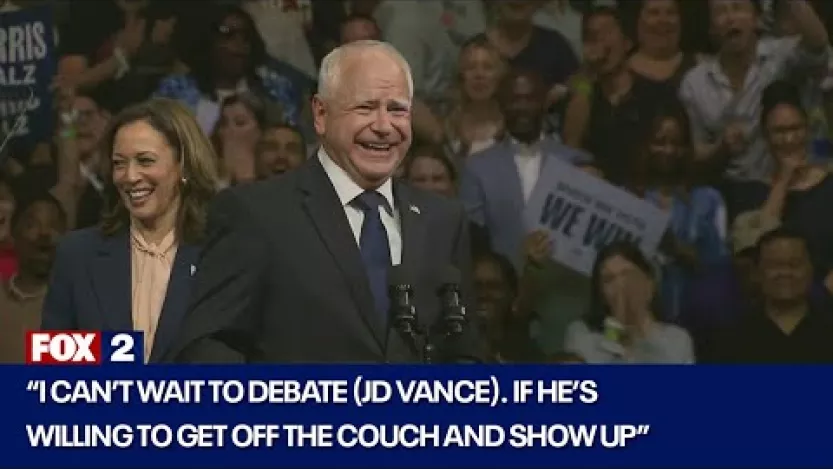Table of Contents
No, JD Vance didn’t fuck a couch. But saying he did is free speech. Here’s why.

Consolidated News Photos via Shutterstock
Republican presidential nominee JD Vance
He certainly didn’t couch his words.
Last night, Democratic vice presidential pick and Minnesota Gov. Tim Walz came to FIRE’s hometown of Philadelphia to campaign with presidential nominee Kamala Harris.
“And I got to tell you, I can’t wait to debate the guy — that is, if he’s willing to get off the couch and show up,” Walz told the crowd. “See what I did there?”

Walz was referencing a now-deleted X post that has morphed from fringe joke into mainstream political consciousness.
X user @rickrudescalves posted on July 15: “can’t say for sure but he might be the first vp pick to have admitted in a ny times bestseller to fucking an Inside-out latex glove shoved between two couch cushions (vance, hillbilly elegy, pp. 179-181).”
I read “Hillbilly Elegy.” I definitely would’ve remembered that.
There’s no truth to the statement. And the X user who tweeted it acknowledged the post was a joke and deleted it about a week later — after it took off.
But if it’s obviously not true, why is it protected?
First, some definitions.
Misinformation is simply false or inaccurate information. Nothing more, nothing less. Disinformation is false or misleading information peddled deliberately to deceive. The two get confused, but both are protected by the First Amendment, and for good reason. And political jokes — well, we’ll get to that.
Political disinformation is nothing new. Thomas Jefferson was Native American? Lincoln had a top secret plan to make a new “American race” via interracial sex? Michelle Obama has a penis? People have been claiming wild falsehoods about the political classes for millenia. (Someday, archaeologists will surely find some ancient graffiti alleging that Julius Caesar is a Muslim and INELIGIBLE to lead.)
It’s up to Americans to weigh evidence for themselves and make up their own minds. If false claims weren’t protected by free speech, we’d have to trust the government to decide the truth for us. That’s exactly why the First Amendment gives wide latitude even to lies, misinformation, and disinformation. Check out our handy explainer on misinformation and disinformation to learn more.
If we sacrifice comedy to save innocent voters from the horrors of misinformation, we’ll lose a lot more than killer SNL skits.
If you think it's bad for government bureaucrats to decide whether claims in the rough and tumble of political debate are true (and worthy of protection) or false (and worthy of punishment), just wait until you add in comedy.
The brouhaha ignores an important part of our national discourse: the ability to joke. 2008 vice presidential nominee Sarah Palin never said she could see Russia from her house. That was Tina Fey. And studies show that 7 in 10 Americans believed it! But if we sacrifice comedy to save innocent voters from the horrors of misinformation, we’ll lose a lot more than killer SNL skits.
The First Amendment rightly protects satire and parody. In 1983, Hustler magazine parodied Jerry Falwell, a nationally known minister and public commentator, in an ad for Campari featuring Falwell recalling a sexual experience with his mother in an outhouse. The cartoon even included a disclaimer that it is an “ad parody not to be taken seriously.” Falwell was awarded $150,000 in damages for intentional infliction of emotional distress before the case was unanimously overturned by the Supreme Court in 1987.
So I can lie all I want?
Like much of First Amendment law, not exactly. Some forms of lying aren’t protected speech, including:
- Fraud
- Perjury
- Defamation
- Making false statements to government officials concerning official matters
- Falsely speaking on behalf of the government
- Impersonating a government officer to exercise false authority over someone
As my colleague Angel Eduardo says in his post on lying and the First Amendment, “Like any deviation from the presumption that speech is protected, these exceptions to the rule are limited, narrowly defined, and place the burden on the government to justify.”
In a free society, there’s only one solution to fight misinformation and disinformation — and that’s an informed citizenry who can separate fact from fiction without the heavy hand of government regulation.
Listen, FIRE isn’t playing the role of a fact-checker in this election. There are lots of other folks with the resources and mandate to do that. But when political disinformation explodes into the national conversation and you have questions about free speech and disinformation — FIRE has your back.
Whether or not it’s gyrating on top of an unsuspecting loveseat.
Recent Articles
Get the latest free speech news and analysis from FIRE.

Can the government ban controversial public holiday displays?

The trouble with banning Fizz

FIRE's 2025 impact in court, on campus, and in our culture


